Jovie/da: Difference between revisions
Created page with '== Beskrivelse ==' |
Created page with 'KDEs tekst til tale-system '''KTTS''' er en applikation, som kører i baggrunden for at oplæse tekst over hele skrivebordet. Det integrerer med mange applikationer og er enkelt ...' |
||
| Line 22: | Line 22: | ||
== Beskrivelse == | == Beskrivelse == | ||
KDEs tekst til tale-system '''KTTS''' er en applikation, som kører i baggrunden for at oplæse tekst over hele skrivebordet. Det integrerer med mange applikationer og er enkelt at bruge. | |||
== Setup == | == Setup == | ||
Revision as of 07:55, 14 September 2010
 |
KDE's tekst til tale-system, KTTS |
Hovedtræk
- Konverterer tekst til lyd
- Meget konfigurerbar
- Erstat fejludtalte ord
- Vælg talesynthesizere
- Konfigurer lyd-output
- Håndter jobs
- Kører i systembakken
- Integrerer med de fleste af KDE's applikationer
- Oplæser tekst fra klippebordet
- Oplæser hele tekstfiler eller udvalgte udsnit i Kate
- Oplæser hele HTML-sider eller udvalgte udsnit i Konqueror
- Kan bruges til bekendtgørelser (KNotify)
Beskrivelse
KDEs tekst til tale-system KTTS er en applikation, som kører i baggrunden for at oplæse tekst over hele skrivebordet. Det integrerer med mange applikationer og er enkelt at bruge.
Setup
Once installed you can start KTTS by going to your applications menu and under open . Or just start KRunner Alt+F2 and run
kttsmgr
. KTTS is not initially setup and you will need to do this before using its speaking abilities.
The first step is to make sure you have a compatible speech engine installed. The following synthesizers are compatible with KTTS: Festival, Festival Lite (flite), Hadifix, Epos, and FreeTTS. Any engine that can be run from commandline can also be used with KTTS.
Now you can continue on and create a Talker. Select the tab from the and click .
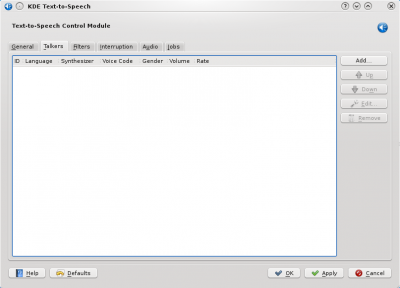
Select which language and synthesizer to use. You will need to have a voice installed to use Festival, you can configure this afterwards by selecting the button. KTTS should now be setup and you can test it by selecting and then .
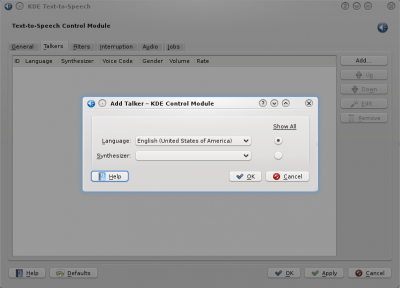
Configuration
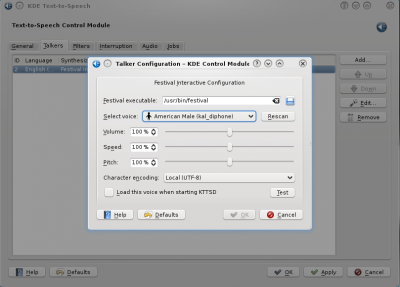
To configure the speaker's voice, volume, speed, and pitch go to the tab and click on the speaker. A window such as the one in the above screenshot will popup and allow you to configure it. To change the voice you will need to have other voices installed.
Using KTTS
System Tray
If enabled in the configuration, KTTS will be availabe to you in the System Tray. Right-clicking it will reveal the menu which is straight forward and allows for control of the speech output.
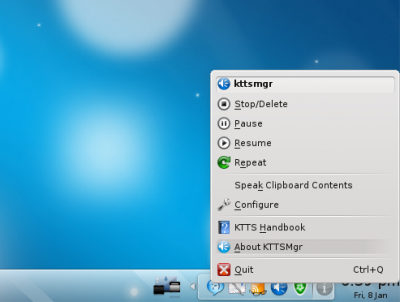
Notice the in the menu, if the application isn't integrated with KTTS (Read more about the applications with KTTS built-in in the next section) you can copy the text you want spoken, and click to hear it read.
Integration with other Desktop Applications
Konqueror
KTTS allows you to speak the text on a web page. In the menu go to . However you may not want to do this because it will also read the HTML headers on the page. Instead highlight the text you want spoken and then select .
Also note this feature is built into Okular as well. In the menu you will be give two choices or .
Notifications
KTTS works with any application that uses notifications. To set this up start an application such as Konversation that uses notifications. In the menu go to
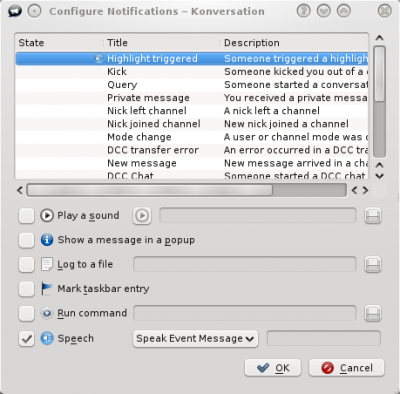
As you can see you can have various notifications for different events, such as when someone triggers a highlight. By selecting it to speak for this event it will notify you through audio output each time this event happens. Of course you can also have more than one notification.
If an application doesn't include the ability to speak text remember that you can always highlight and copy text and then use KTTS to speak your clipboard contents.
For more information check out the KTTS Handbook included with KTTS.
KTTS was renamed to Jovie during 4.5 release cycle. Thus, if you cannot find ktts package in your distribution just install Jovie.
For more information please refer to Jovie handbook.

